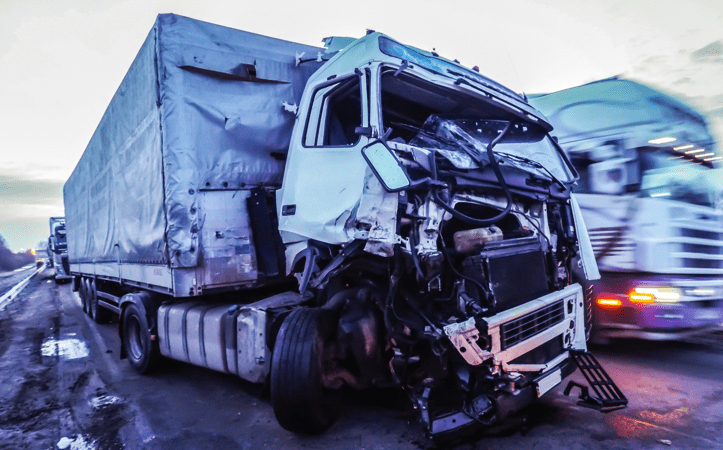Introduction:
Being involved in a truck accident is an unsettling and potentially life-altering experience. The sheer size and weight of commercial trucks make these accidents particularly devastating, often resulting in severe injuries, extensive property damage, and emotional trauma. While the immediate aftermath of a truck accident can be overwhelming, knowing how to react and what steps to take can make a substantial difference in ensuring your safety, protecting your legal rights, and securing fair compensation for the damages you’ve suffered.
In this comprehensive guide, we will delve into the crucial actions you should take after a truck accident. Whether you’re a driver, passenger, or even a pedestrian affected by the collision, being informed about these steps will empower you to navigate the aftermath with a clearer sense of purpose. From ensuring the well-being of everyone involved to collecting vital evidence, dealing with insurance companies, and possibly pursuing legal action, each step is a piece of the puzzle that contributes to your overall recovery.
Truck accidents can be caused by various factors such as driver fatigue, mechanical failures, hazardous road conditions, or even improper loading of cargo. These factors can magnify the complexity of the situation, emphasizing the importance of being prepared to handle the aftermath. Moreover, given the potential for catastrophic injuries and property damage, understanding what to do after a truck accident goes beyond just a routine response—it’s about safeguarding your future, physical well-being, and financial stability.
While this guide provides a comprehensive outline of actions to take, it’s important to recognize that every truck accident case is unique. Circumstances, injuries, and legal considerations may vary. As you read through the following sections, keep in mind that seeking professional advice from legal experts, medical professionals, and insurance representatives can offer tailored guidance to your specific situation.
Remember, the moments following a truck accident can be chaotic, and emotions may run high. By acquainting yourself with the steps outlined in this guide, you’re arming yourself with the knowledge and tools needed to manage the situation effectively. From the initial shock to the eventual resolution of your case, being well-informed can help alleviate some of the stress and uncertainty that often accompany such challenging circumstances. So, let’s dive into the actionable steps you should take after a truck accident, ensuring that you’re prepared for whatever lies ahead on the road to recovery.
-
Prioritize Safety:
The first and foremost concern after a truck accident is safety. Ensure your safety and the safety of others involved by moving to a safe location, away from oncoming traffic. Turn on hazard lights, set up warning signs or flares if available, and call emergency services to report the accident.
-
Check for Injuries:
Evaluate your personal injuries as well as the injuries sustained by your passengers. If there are serious injuries, refrain from moving injured individuals unless it’s necessary to prevent further harm. Promptly request medical assistance for injured parties.
-
Contact Law Enforcement:
Call the local police to report the accident. An official police report will be crucial for insurance claims and legal proceedings. Provide accurate and detailed information to the officers, but refrain from admitting fault.
-
Exchange Information:
Exchange contact, insurance, and vehicle details with the truck driver and any other parties involved in the accident. Gather their names, phone numbers, addresses, insurance policy numbers, license plate numbers, and the trucking company’s information, if applicable.
-
Document the Scene:
Use your smartphone to take photos and videos of the accident scene, including vehicle damage, road conditions, traffic signs, and any relevant landmarks. This visual evidence can be immensely valuable during insurance claims and legal proceedings.
-
Gather Witness Statements:
If there were witnesses to the accident, ask for their contact information and brief statements about what they saw. Their unbiased accounts can provide additional support for your case.
-
Avoid Discussing Fault:
Refrain from admitting fault, even if you believe you were responsible for the accident. Fault determination involves a thorough investigation, and statements made at the scene could be used against you later.
-
Seek Medical Attention:
Even if you don’t perceive any immediate injuries, it’s advisable to seek medical attention. Some injuries, like internal trauma or whiplash, might not manifest symptoms until later. A medical record will also serve as evidence of any injuries sustained.
-
Notify Your Insurance Company:
Get in touch with your insurance provider at your earliest convenience to inform them about the incident. Provide them with accurate information and adhere to any requirements for documentation submission. Be cautious when speaking with the other party’s insurance company, as they might try to use your statements against you.
-
Consult an Attorney:
If the accident resulted in significant damage, injuries, or complex liability issues, consider consulting a Fort Lauderdale truck accident lawyer. An attorney can help protect your rights, negotiate with insurance companies, and guide you through potential legal actions.
-
Preserve Evidence:
Keep all documents related to the accident, including medical bills, repair estimates, rental car receipts, and correspondence with insurance companies. These records will play a pivotal role in constructing a robust legal argument.
-
Be Mindful of Social Media:
Avoid discussing the accident or any injuries you sustained on social media channels. Insurance companies and legal opponents can use your posts against you, potentially impacting your case.
Conclusion:
Experiencing a truck accident can be distressing, but following these steps can help you navigate the aftermath more effectively. By prioritizing safety, seeking medical attention, documenting the scene, and seeking legal guidance if needed, you can protect your well-being, rights, and potential compensation. Remember, acting calmly and responsibly in the aftermath of a truck accident can make a significant difference in your recovery and the eventual resolution of the situation.
